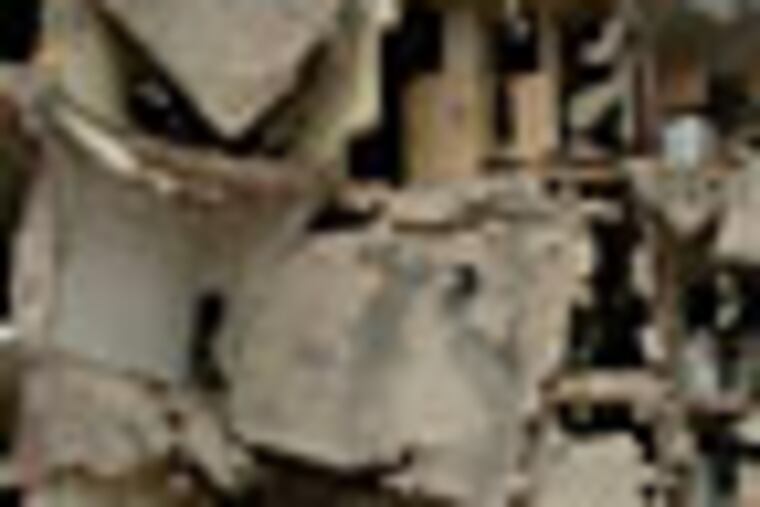Blasts kill nine in Syria
Two suicide bombings near a security compound also wounded 100. The government and opposition traded blame.

BEIRUT - In fresh attacks on symbols of state power, twin suicide bombs exploded Monday near a government security compound in northern Syria and rockets struck the central bank in Damascus, killing nine people and wounding 100.
The regime and the opposition traded blame, accusing each other of dooming a United Nations plan to calm violence that has largely failed so far. The head of the U.N. observer mission acknowledged that his force cannot solve the country's crisis alone and urged both sides to stop fighting.
The attacks are the latest in a series of suicide bombings that started in December and have mostly targeted Syrian military and intelligence positions.
The regime routinely blames the opposition, which denies having a role or the capability to carry out such attacks. After other similar bombings, U.S. officials suggested al-Qaeda militants may be joining the fray, and an al-Qaeda-inspired Islamist group has claimed responsibility for previous attacks in Syria.
The powerful blasts, which blew two craters in the ground and ripped the facade off a multistory building, came a day after Maj. Gen. Robert Mood, the head of the observer mission, took up his post in Damascus.
"Ten, 30, 300, or 1,000 observers will not solve all problems," he told reporters Monday. "So everyone has to help us achieve this mission."
More than 9,000 people have been killed in the 13-month crisis, according to the U.N.
An April 12 cease-fire agreement has helped reduce violence, but fighting persists, and U.N. officials have singled out the Syrian regime as the main aggressor.
An advance team of 16 U.N. observers is on the ground to try to salvage the truce, which is part of a broader plan by special envoy Kofi Annan to launch talks between President Bashar al-Assad and his opponents. By mid-May, the team is to grow to 100, but U.N. officials have not said when a full 300-member contingent would be deployed.
Monday's bombs went off in the northern city of Idlib, an opposition stronghold that government troops recaptured in a military offensive this year. TV footage of the aftermath from the blasts showed torn flesh, burned-out cars, twisted debris, and pavement stained with blood. The force of the explosions shattered windows and sent debris flying for hundreds of yards.
"Is this their freedom?" one man yelled at the cameras at one of the blast sites.
A distraught woman shouted: "What have we done to those people? What have women, children, and the elderly done to them?"
The state-run news agency SANA said security forces and civilians were among those killed. State TV said many of the nearly 100 wounded were civilians.
The bombers detonated their explosives near a military compound and near Idlib's Carlton Hotel, SANA said.
A local activist, who only gave his first name, Ibrahim, for fear of repercussions, said the two sites bombed in Idlib are several hundred feet apart and that the explosions went off within five minutes of each other after daybreak Monday.
There was no immediate claim of responsibility for the attacks. State media blamed "armed terrorists," a term it uses for rebels trying to topple the government. Activists claimed the regime was behind the bombings to discredit the opposition.
A statement by the Local Coordination Committees activist network called the series of suicide blasts "fabricated, staged explosions" and said "they can no longer fool anyone."
Two members of the U.N. observer team toured the blast sites, SANA said. Ibrahim said the observers have been staying at the Carlton, and a pro-government website reported that the hotel sustained some damage.
U.N. Secretary-General Ban Ki-moon condemned "the terrorist bomb attacks" in Idlib and Damascus, U.N. deputy spokesman Eduardo del Buey said.
Analysts said it was doubtful the presence of U.N. observers would help improve the situation or halt such bombings.
"The U.N. is a political body, not an investigative body. The U.N. creates a political consensus among countries, but it's not a judge and jury about which side violated what agreement," said Jon Alterman, Middle East director at the Center for Strategic and International Studies in Washington.